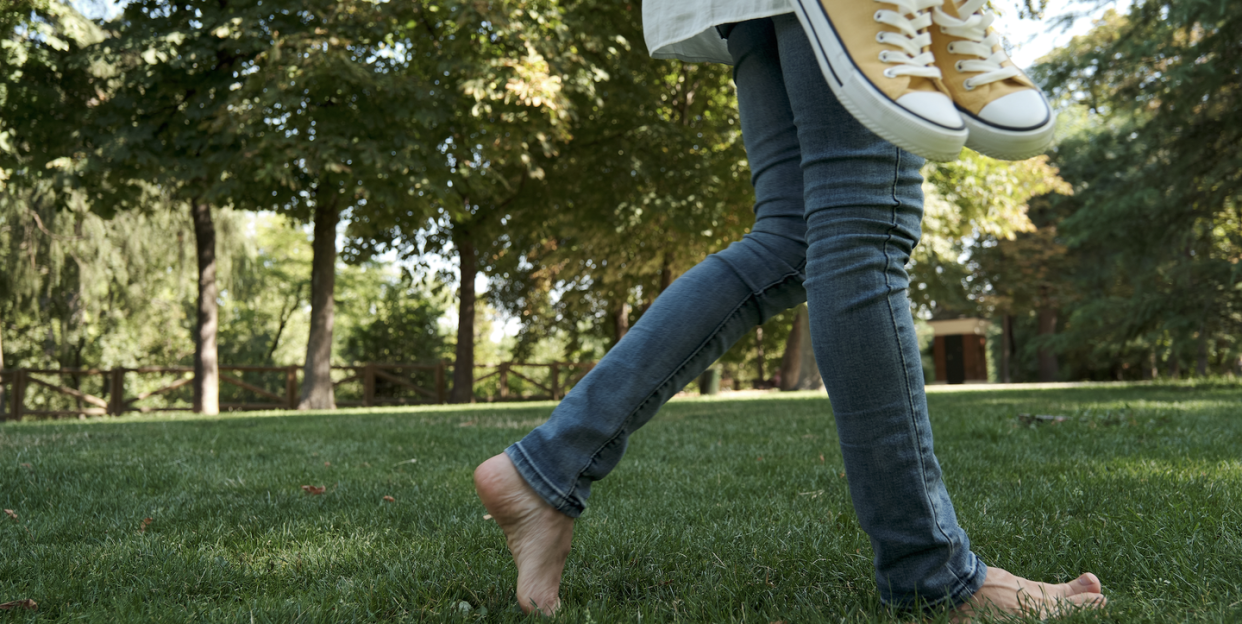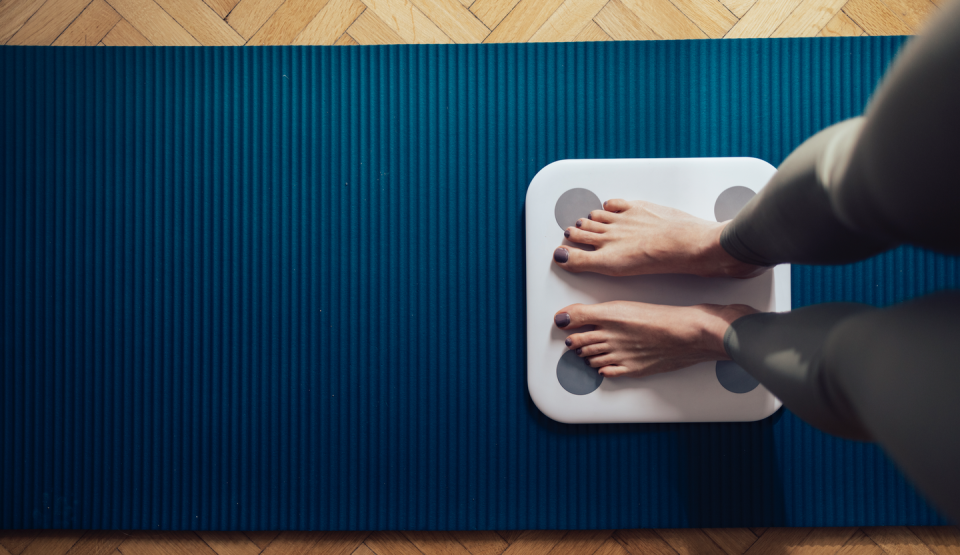So can walking around barefoot really be good for your health? EYNTK about grounding

There’s so many wellness trends out there at the moment, it’s difficult to know exactly what you should be giving a try.
From aerial yoga to calisthenics, there’s tonnes of workouts out there too, but self-care regimes needn’t be high octane to be beneficial.
Enter grounding, or ‘earthing’ – the practise of ‘reconnecting with the Earth’ in order to promote healing with your body.
Still a relatively new concept, many of the benefits that certain people claim are yet to be officially proven in scientific study.
However, it is an increasingly popular method with those converted claiming it has had a positive effect on chronic pain, mental health and even sleep disorders.
Cosmopolitan UK has spoken to fitness professionals to get the lowdown on grounding, and see if it really can benefit us at all…
What is grounding and how does it work?
In its very simplest terms, grounding is effectively… walking around barefoot outside.
As a therapeutic practise, the aim of grounding (or earthing, as it is sometimes known) relies on how the Earth’s electrical currents can impact and influence your body.
Sounds a bit woo-woo? Well, there is some science that backs this up.
One study published in 2015 found that grounding can affect the matrix that connects our cells, and harnessing electrical conductivity in our body can function as an immune defence system. The study thereby claims that through regular grounding, you can restore some of your body’s natural defences.
“Our bodies thrive in continuous electrical contact with the Earth's surface,” explains National Academy of Sports Medicine-certified personal trainer, Ben Jenks. “Yet, in modern life, we lose that connection, building up damaging free radicals and inflammation that suppress health. Grounding essentially acts like an antioxidant, delivering stabilising electrons that neutralise and balance our systems.”

While there are further studies which point towards grounding having a positive effect (we’ll come onto that later), it should be pointed out research in this area is limited, and sample sizes have been small – so the jury is still out on this one.
How do I ground myself?
If you’re lucky enough to have a garden or some sort of (clean) outdoor space, walking around barefoot on pavement, grass or sand is thought to help with grounding.
But there is also specialised equipment that helps with grounding. You can find a variety of grounding mats which are understood to conduct the earth’s “natural” energy through an electric outlet. The idea is to replicate the physical connectivity one might make by walking barefoot on the ground.
How long should I practise grounding for?
Again, there’s no hard and fast rule for grounding, but generally relatively short bursts seem to prove effective, according to practitioners.
“To get the most out of grounding, it's best to practice it between 20-30 minutes a day,” explains Abbie Watkins, personal trainer at OriGym. “However, many people notice the difference from practicing for just a few minutes. Remember consistency is more important than duration here.”
What does grounding do to your body?
Regular grounding claims to have numerous positive effects.
“Some research suggests that grounding mats may help reduce inflammation in the body,” explains Fitness First personal trainer James Barr. “Inflammation is linked to various chronic diseases such as arthritis, heart disease, and cancer.”
A 2017 study examined the role of grounding on post-exercise muscle damage. Researchers used both grounding patches and mats and measured creatine kinase, white blood cell count, and pain levels before and after grounding. Blood tests suggest that grounding reduced muscle damage and pain in participants, which indicates grounding may influence healing abilities.
“By connecting to the Earth's surface, grounding mats may help neutralise free radicals and decrease inflammation, thereby potentially reducing the risk of these diseases."
Can grounding help with sleep?
Some people using grounding mats have claimed to find their sleep has improved. A recent 2022 study in the journal Healthcare revealed that grounding was also beneficial for improving sleep quality in patients with dementia. Some experts believe that this is because grounding and spending time outside keeps our cortisol levels in check, aiding quality sleep.
“The Earth's natural electromagnetic field may help regulate circadian rhythms and promote deeper, more restful sleep,” explains Barr. “By using a grounding mat, individuals may experience better sleep patterns, decreased nighttime awakenings, and overall improved sleep quality.”
Another alleged benefit of grounding is that it helps reduce stress levels and improves mental health.
“Grounding mats have been associated with stress reduction and relaxation,” says Barr. “Connecting to the Earth's energy may help balance the body's electrical systems, promote relaxation, and reduce feelings of stress and anxiety. Some users of grounding mats report feeling calmer, more centered, and less tense after using them regularly.”
A small 2019 study backs this up: 16 massage therapists alternated between periods of grounding and no grounding.

Before grounding therapy, physical and emotional stress and pain were common side effects of their physically demanding jobs. After the earthing therapy, pain, stress, depression, and fatigue were all reduced among participants.
As stressed before, these are relatively small and sparse samples; further research needs to be done before we can conclusively say grounding definitely works - and who knows, maybe the rumoured benefits are more related to simply being outside, getting more sunlight and seeing nature, as opposed to anything linked to the Earth's electricity.
“Individual experiences with grounding may vary, and they should not be considered a replacement for medical treatment or advice,” adds Barr.
Are there any risks of grounding?
As a lot of grounding activities take place outside, there aren’t loads of health risks – just ensure that where you are grounding is clean.
And remember that grounding will not cure any of the ailments listed above. If you really are struggling with your health, it is vital you speak to a qualified health practitioner first.
This article is not intended to be a substitute for professional medical advice or diagnosis. Always seek the advice of your physician or other qualified health provider with any questions you may have regarding a medical condition.
You Might Also Like


